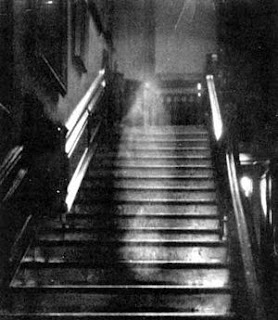a ghost is a failed goodbye
Ghosts, I want to say, are intrinsically mournful phenomena. Their very form speaks essentially of loss. They seem to beckon to us from another world. They might reach out to touch us, but are yet pulled back into their spirit realm. A realm that is out of the reach of the quick. (They always come to us.)
I offer such thoughts not because I or you 'believe in' ghosts. Of course we don't. Instead I'm trying to find some words which attach themselves naturally to the very idea of the ghost. I go on below to ask into the significance of such natural attachments.
Another important concept here is that of 'haunting'. The ghost is a departed spirit who won't leave the living alone.
I wrote before that a ghost is a failed goodbye. A phantom limb is another example of this: this leg or arm that the brain can't mourn, this body schema that can't be updated despite the patient's best conscious efforts. (Two other examples already given: the habitually worn bracelet taken off, or the broken escalator mounted: we feel a phantom bracelet on our arm; we feel a disconcerting lurch on embarking the static escalator.)
In certain conditions absence is experienced as haunting presence. Which conditions? Conditions when the expectations which structured our relationship with the departed are not extinguished, not worked through. Conditions of failed mourning. These expectations are scattered across the gamut of our bodily anticipations, and do not belong properly simply to what we can verbally express. The criteria for mourning are diverse and dissociable.
So a ghost is generated by the clash between latent expectation and the reality of absence. They speak essentially of loss because of this. We have a folklore and the folklore has ontological significance. The folklore is that ghosts aren't, say, simply beings from 'another realm', nor gaseous beings from this 'realm'. Instead they are most definitely the spirits of the departed. The spirits have not managed to let go of this world. Perhaps they still have something to tell us. Perhaps they still have a grievance against us. Perhaps they beckon to us from beyond the grave.
The question is what all this means. Freud had a thought about melancholia which we can adapt here. The thought was that the depressed bereaved may find it hard to mourn when they had unresolved (unconscious) ambivalent feelings toward the departed. There is something that we have or need to say to the departed, something which our relationship (in its positive elements, say) and their demise have thwarted. We want to call out to them. We want to summon them.
The ghost is the inverse of our unconscious desires. It is easy to say something lazy like: 'it is the projection into the world of our unconscious desires (to see, to harangue, the person again)'. But it just isn't a 'projection' in any meaningful sense. (This is to think like the cognitivist who says that we 'project' the 'colourful visual image' into the world where we then 'see' it.) What it is, I claim, is the admixture of uncancelled anticipation with null sensory fulfilment. And the ghost's 'negative' character - in the sense of a photographic negative - is manifest in all these ways: the ghost is lighter than its surroundings whereas the quick would be darker; it calls to us when we want to call to it; it beckons when we wish to beckon; it won't leave us alone when we can't let it go; it can't leave the world of the quick when it is really we who can't let it depart; it beckons to us from its 'other world' when we impossibly want to beckon to it from within this world. It is an intrinsically mournful phenomenon - whilst we are struggling to mourn.


Comments
Post a Comment
Comment here!